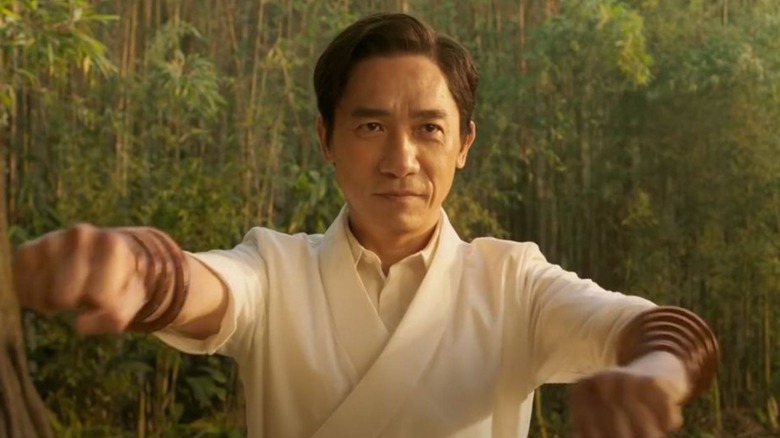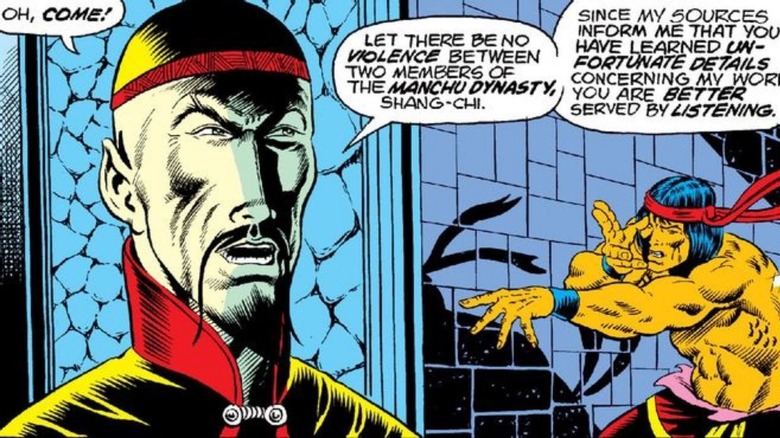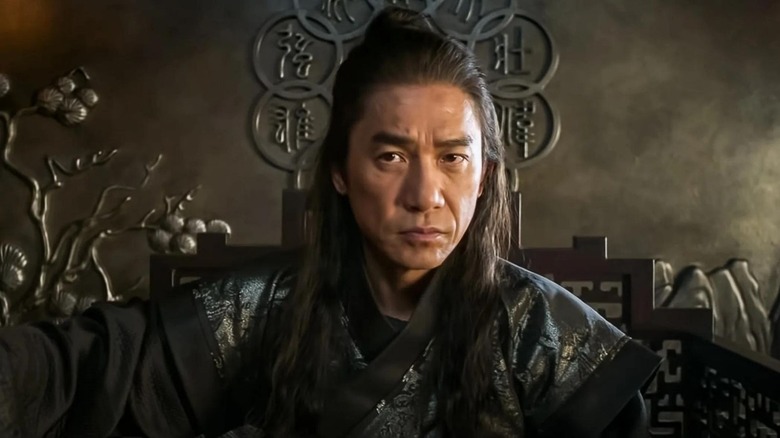Why Shang-Chi's Big Bad Was So Difficult To Get Right
Easily one of the Marvel Cinematic Universe's best standalone films of all time, Destin Daniel Cretton's "Shang-Chi and the Legend of the Ten Rings" introduced Xu Wenwu AKA The Mandarin, a character who has been a long towering figure in Marvel comics. Only this time, it was the real Mandarin.
The character has appeared in the MCU before, introduced as the main antagonist of "Iron Man 3." Ben Kingsley played an imposter of the terrorist organization head, a man playing a part (much like he does in "Shang-Chi") hired by Guy Pearce's Aldrich Killian.
So, when Marvel Studios decided that they would reintroduce the character — properly this time — with Tony Leung bringing him to life, it wasn't an easy task. Not because the actor was playing a revered MCU villain for the first time, but because the script had to reflect a three-dimensional character, one that was malicious and feared by many, but also one that was human and motivated by love.
The MCU is usually pretty clear about its treatment of heroes and villains — the good guys save everyone from the bad guys. But in "Shang-Chi," Wenwu isn't just the bad guy. The centuries-spanning tyrant who wants to conquer worlds with his mythical Ten Rings is a profoundly layered character ... unlike the one in the comic books.
Wenwu Isn't Just Good, Or Bad
It's important to note that "Shang-Chi" had two important tasks at hand — one, to reimagine its villain's comic book origin, which was mired in a bundle of racist stereotypes, and two, to write a relatable character, despite the extent of his nefarious activities. Wenwu, as seen in the film, isn't Shang-Chi's father in the comics — Fu Manchu is. And he's a power-hungry, curved fingernail-wielding, yellow-skinned mystical Asian man obsessed with conquering the West.
Created by novelist Sax Rohmer in 1913, Fu Manchu is an archetype for an evil Asian man which has been widely criticized as racist. He's a symbol of the Yellow Peril stereotype and was described by the author as "yellow peril incarnate." Fu Manchu became a famous 20th century villain and was recreated for film and television (even Nicolas Cage played an iteration of him in the 2007 film "Grindhouse").
Then came Marvel Comics. In the 1970s, they licensed Fu Manchu and gave the character a son, Shang-Chi, pitting the father-and-son as archenemies. The comics were discontinued in 1983, and once again relaunched in 2020, under the leadership of award-winning writer Gene Luen Yang, who renamed the character Zheng Zu. Unfortunately, the character's xenophobic origins remained, and stereotypical elements such as Fu Manchu's goatee was continued to be seen.
So, when filmmaker Destin Daniel Cretton pitched "Shang-Chi and the Legend of the Ten Rings" to Marvel Studios, he decided to do something no one had before: see Shang-Chi's villainous father as a human being. He completely reinvented the character, bringing in The Mandarin (a popular comic-book villain) as Shang-Chi's father, throwing away all previously prevalent racial stereotypes out the window and rewriting him with great emotional gravitas. Wenwu still descends from an archetype created out of contempt towards an entire people, but Daniel Cretton and the crew behind the film added a new dimension to the character that had been damaging a community's sentiments and spewing hatred against them for decades.
The Mandarin might have been retconned and reimagined for "Shang-Chi," but his history is perhaps why Marvel has been so hesitant to bring the character to the big screen. "Shang-Chi," the studio's first Asian-led superhero film, endeavored at remedying the racist caricature depicted by Fu Manchu in the comics and decided to rewrite its history with The Mandarin/Wenwu, a man motivated by love and grief.
It's All About The Balance
In conversation with The Hollywood Reporter, "Shang-Chi" writer Dave Callaham detailed how The Mandarin was a difficult character to write. There had to be a balance between making him terrifying and yet relatable, which was tricky.
Dave Callaham, who also wrote "Wonder Woman 1984" and "Mortal Kombat," shared that Wenwu was "a character that was really hard to massage into the final form." And it wasn't because of Leung, but because of the character himself, and the emotions that motivated him. Callaham was committed to writing a character that belonged in the gray area between being a hero or a villain, someone who wanted to piece his life back together, however best he could, with whatever he had. Callaham said:
"It's just because of the things that he believes and because of the motivations he's utilizing to get to these more villainous ideas. One step too far in either direction and he's not scary enough or he's totally unrelatable and kind of a nonsense villain. We wanted this character to be three-dimensional. He's motivated, ultimately, by love. He is this broken man who has made a bit of a mess of his very long life and just wants desperately to believe he can put things back together, and that's all very human and very relatable. But we did still need him to be the figurehead of a giant terrorist organization who is looking for magical villages and presumably torturing people in his dungeon and all this other stuff. Finding that balance was tricky."
Wenwu's character arc often outshined that of Shang-Chi, the titular character played by Canadian actor Simu Liu. From the ruthless conqueror to the tragic antihero, Wenwu became a character you could love and yet be repulsed by, a triumph that can be credited to both, Callaham's emotionally complex script, and Tony Leung's devastatingly expressive eyes.


